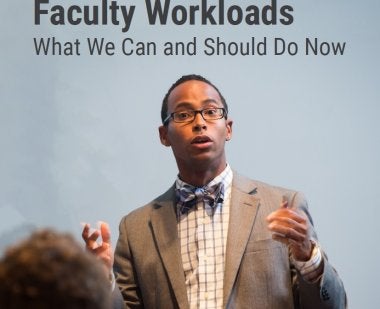

COE Researchers Address Faculty Workload Inequities in ACE Report

The unequal distribution of faculty labor is an issue faced by many higher education institutions. In a new American Council on Education report, two University of Maryland researchers studied how to address these inequities, which often undermine the full participation of women and Black, Brown, and Indigenous faculty members in academe.
The report summarizes findings from a National Science Foundation ADVANCE-funded research project that worked with 51 academic departments in universities nationwide to study and promote faculty workload equity. KerryAnn O’Meara, COE Professor, and Dawn Culpepper, COE doctoral candidate and faculty specialist with the UMD ADVANCE Program for Inclusive Excellence, are lead authors.
“Faculty workload represents a critical, yet often overlooked, place where inequity in academia persists,” said Dr. O’Meara.
Workload in academia can often be skewed in the way it is taken up, assigned, and rewarded. Black, Brown, and Indigenous faculty members tend to take on more diversity-related service, mentoring, and advising, while women take on more teaching and service roles than their academic counterparts, for instance.
“Fulfilling these activities is vital to the functioning of departments and institutions, but often invisible and unrewarded, which can contribute to lower research productivity and decreased retention,” Culpepper explained. “We wanted to tackle this problem of unequal workloads and identify strategies that departments could use to disrupt workload inequities.”
In particular, the researchers focused on six conditions linked to equitable workloads: transparency, clarity, credit, norms, context, and accountability. For each of the six conditions, the study provides specific examples of policies and practices that departments can use to encourage fairness and equity in faculty workload. Faculty members in departments that fostered such conditions, such as increasing clarity by creating faculty workload expectation guidelines, for instance, reported greater satisfaction with their workloads.
“We wanted to identify a workload equity process that departments could use, beginning with an analysis of workload data and ending with the implementation of equity-minded workload policies and practices,” said Dr. O’Meara. “Addressing workload equity can seem like an insurmountable problem, but our showed study showed that there are strategies units can use to ensure that faculty workload is fairer.”
The research comes at a particularly critical time, with recent studies suggesting that the COVID-19 pandemic has intensified faculty workload inequities. With faculty workload growing related to virtual instruction and students’ increased advising and mentoring, the need for evidence-based workload strategies is all the more urgent, according to the authors.